In our last post, we reviewed why you should become a better dry camper. In this post, we are going to look at how to become a better dry camper.
Now, if you have never extensively dry camped or you’re just looking to join the RV lifestyle, here is the list of resources that you will need to learn to manage to become a better dry camper.
With rare exceptions, the order of importance for most RVs and RVers is as follows:
- Conserving and recharging your house batteries – managing power needs
- Conserving/maximizing your potable water supply
- Minimizing the amount of grey water that enters your grey tank
- Obtaining potable water when you run dry
- Finding somewhere to dump your tanks when full (black & grey)
A very distant 6th is conserving propane, which is rarely an issue for most RVers, so it won’t be addressed in this entry.

Become a better dry camper and enjoy campsites like this. Photos via author
I have covered most of these subjects in previous blogs, so to save you the time and trouble of going back through the past 12 years of entries, I have gathered together the links by topic for your convenience.
Please keep in mind these were written for those just learning to dry camp/boondock for short periods of time. Seasoned dry campers that stay somewhere for weeks or months employ more advanced techniques than I am sharing here.
Conserving and recharging your house batteries, along with other electrical tips:
- Conserving your house batteries
- Using a generator or solar system to recharge your batteries – Please note this entry was written many years ago, and since then, most manufacturers have been installing converter chargers with beefed up charge capacity, so know the charge rate of your converter charger and plan accordingly.
- Determining your power needs
- How long will your batteries last?
- Batteries and Winter Camping
- A convenient item to power low wattage 120-volt electricity while dry camping
- Useful items in place of 120-volt items while dry camping
Conserving your potable water supply:
Minimizing the amount of grey water that enters your grey tank:
Obtaining potable water when you run dry:
Addition useful dry camping tips from past blogs:
- If you are looking to buy an RV and plan on doing a lot of dry camping, here are 5 important features you should consider.
- Have a backup plan for when systems fail
By employing and practicing the tips shared above, you will become a better dry camper and can start enjoying the freedom that comes with it. Becoming free from hookups, just another adventure of RVing!

We’re on our 14th year of dry camping. We live off-grid all the time. I suggest that knowing how long you can go on your tanks is the main concern. Learning to preserve your electricity needs is also key.
Knowing your limits (how long) is key. Suggest you stay in a RV park without using their utilities, and find out how long you can go without using those utilities. Then, you can use that knowledge to better your utilization of your resources…..then, dump and refill.
We are in our first couple of years full-timing. Last summer we went 77 days uninterrupted dry camping…I think we cheat a little, but we always use public restrooms if available…have one jug of water for toilet flushing & one jug for kitchen use. The generator is run every couple of days to recharge batteries, or if we have a reason for using it. We had no need for A/C or heat during those days, so no large electric draws. Down the road 1/2 mile a convenience store had a hydrant for anyone needing water. Across the highway was a rest area with dumpsters. WIFI was available at that spot using our phone as a hotspot. I think we dumped once for a $3 charge at the rest area at the end of the first month. Sometimes it’s a little extra effort, but not having to break camp to dump is nice (37′ Class A) Even when available we never connect to water, just hook up to electric. We also, never connect to sewer unless to dump. Maybe we will change our ways over time, but this works for us now.
What site do I use to post rv generator for sale so dry campers see it.
It would be nice to know how people who need C-Pap machines deal with that issue.
Doing very dry camping this weekend. Power is out. Using Class C for driveway shelter with heat. Have 100W solar plus 4k generator . No water used. Just warm. Go in house for bathroom.
To save fresh and gray water use I have a valve I found on Amazon that goes where the aerator used to be on the facet.
When washing hands, shaving or brushing teeth I just brush the stem to get water flow.